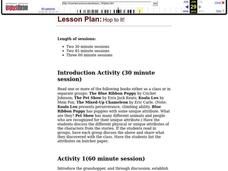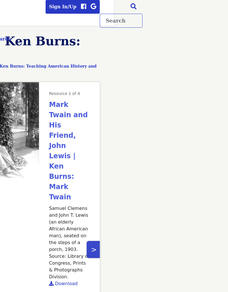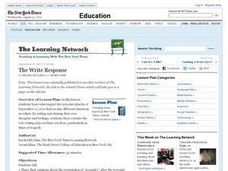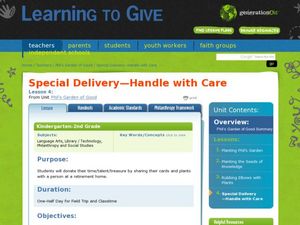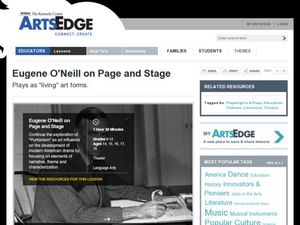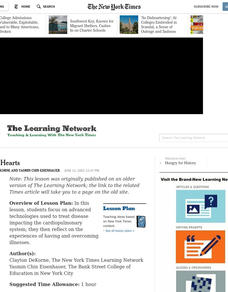Curated OER
The Times, Are They A-Changing?
Students read and discuss article, "We Agreed to Agree, and Forgot to Notice," participate in anonymous mock presidential primary ballot, and share reactions to Iowa caucus results. Students then collect statements made by candidates on...
Curated OER
Hop To It!
Young scholars explore grasshoppers. In this grasshoppers lesson, students measure the jumping distance of live grasshoppers. Young scholars then record the jumping distance of people in their group. Students record the distances and...
Curated OER
Fighting the War in Your Head
Students analyze the experiences of a fictional soldier in a war and create a mental health profile for that individual. They emulate psychiatrists and propose treatment strategies for their particular soldier's post-traumatic stress...
Curated OER
A Report From the 21st Century - Mark Twain
Students look at Twain, the humorist - considered America's favorite storyteller and the funniest man in the world at the time. Students stretch the truth about a personal experience, and consider how delivery affects impact.
Curated OER
Work Cut Out For You
Students read about teenagers who forgo college for work. They plan their own progression toward their careers of choice by creating 'fantasy résumés' that list both their present accomplishments and things they hope to do in the future.
Curated OER
Polluting the Environment
Fourth graders construct mini-ecosystem, pollute the ecosystem, observe, collect, and record data on the effects of these pollutants on their ecosystem, organize data on spreadsheets, create graphs, and design presentations to share with...
Curated OER
The Call of the Wild
Students read The Call of the Wild, noting its theme of survival. They investigate the book's concepts with word webs, spider maps, or graphic organizers. They conduct a panel discussion on dogs and wolves. They write a letter to the...
Curated OER
The Write Response
Students explore what impact the terrorist attacks of September 11, 2001 had on nine different American novelists. They write and share their own thoughts and feelings, then consider the role writing plays in their own lives,...
Curated OER
Going the Distance
Students experiment in small groups to answer the question, "Is there a relationship between ramps and speed?" They apply a formula to calculate the speed of the cars used in the experiment, complete the associate lab report, and...
Curated OER
Does Clear Water mean Healthy Water?
Learners test their local aquatic site to determine its water clarity. They collect a water sample and measure its turbidity using a sensor, then they repeat the experiment to obtain a second turbidity reading to find the average value.
Curated OER
Old Bear
Students explore different aspects of nature through a bear. In this lesson about Old Bear, students understand nature and how it all works together. Students read the story and then participate in answering discussion questions about...
Curated OER
Story-Hour Kit
Students explore four picture books. In this early childhood lesson, students are read the books, discuss them, and then complete extension activities. These include writing and illustrating their own experiences, practice with emotions,...
Curated OER
Phil's Garden of Good
Learners read "The Rainbow Fish" and discuss how the fish benefited by giving others. In this sharing lesson, students prepare plants and letters for senior citizens. Learners present their letters and plants at a visit to a senior...
Curated OER
How Does Your Garden Grow?
Students read The Garden by Arnold Lobel, plant seeds to discover what makes them grow, and record their observations in their journals.
Curated OER
Introducing Nonfiction
Students are introduced to nonfiction text. In this five esson unti, students explore nonfiction as a genre. They identify the components and text structure of text structure of nonfiction text. Students read a nonfiction passage and...
Curated OER
Polar Express Lesson Plan
Young scholars develop a podcast as they retell the story of The Polar Express. In this early childhood lesson plan, students experience technology by creating a podcast. Young scholars also create illustrations to be scanned for the...
Curated OER
No Regrets: a Poetry Analysis
Young scholars read a poem and use the TPCASTT strategy for analysis. In this poetry analysis lesson, students journal about their future goals and read John Updike's "Ex-Basketball Player." Young scholars discuss the purpose of the poem...
Curated OER
Eugene O'Neill on Page and Stage
Students investigate the life and works of Eugene O'Neill. In this American theater lesson, students read biographical information about O'Neill and review Long Day's Journey into Night. Students then analyze the play in order to deliver...
Curated OER
Variable Skies
Learners examine factors which affect a vortex and create model tornadoes. They identify variables, pose a testable question, and perform an experiment using the scientific method. After they collect their data, students write a complete...
Curated OER
Healthy Hearts
Students focus on advanced technologies used to treat disease impacting the cardiopulmonary system; they then reflect on the experiences of having and overcoming illnesses.
Curated OER
Talking Trash - Online Message Boards
Students consider their own experiences with online message boards and chat rooms, discover how teens are using the Web to talk about people in their lives, discuss the issues surrounding online conversations.
Curated OER
Musical Imagery
Learners experience musical imagery. They link this musical concept to literary imagery to gain an understanding of the use of imagery in both genres. After listening to a varriety of sounds, students will compose and perform a melody.
Curated OER
A Valid Conclusion? Testing and Reporting on Hypotheses Using the Scientific Method
Students explore importance of accuracy in reporting, focusing particularly on articles documenting scientific discoveries, and practice scientific method by conducting experiments to test and report on scientific hypotheses.
Curated OER
Would You Believe Your Eyes?
Learners study the parts and functions of the human eye. They create dodecagons which are twelve-sided figures with twelve equal angles and share these with the class so that each student can begin to see how many different illusions can...



